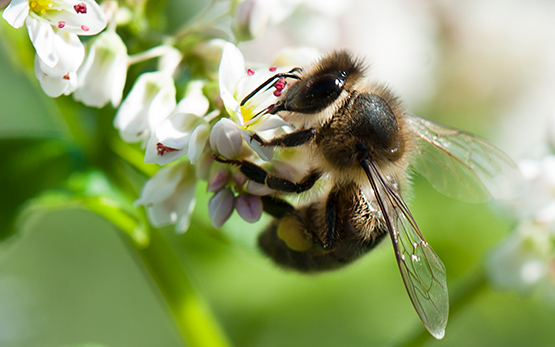With their role in pollinating crops and wild plants, bees provide an important service for the ecosystem, agriculture and thus the food we eat. How can they be protected against potential risks? Bee researchers from all around the world met to consider this question at the symposium of the International Commission for Plant-Pollinator Relationships (ICPPR) organised by Agroscope.
Around 160 bee experts from 20 countries met at the ICPPR’s 14th International Symposium on Hazards of Pesticides to Bees to exchange ideas on the risks that pesticides can pose to bees and to discuss the latest solutions. The conference was held from 23 to 25 October in Bern. Agroscope played a key role, both via the participation of its Bee Research Centre and as an organiser.
The conference focused on how test methods and risk assessment procedures can be optimised to protect honey bees and wild bees even more effectively. ‘Test methods are continually being refined, or new methods developed – these range from laboratory tests to field trials and are being combined,’ explains Dr Jens Pistorius of Germany’s Julius Kühn-Institut, who chairs the symposium’s scientific committee. ‘The aim is to develop internationally recognised guidelines to identify risks in the context of pesticide licensing and to take optimal measures to protect bees’.
Besides method validations, which are important for the continuing development of international guidelines, attendees presented and discussed research results on new or previously known critical substances. Work in recent years has focused especially closely on the development of suitable test methods for wild bees. A number of guidelines have already been developed and adopted at OECD level.
‘The symposium was a complete success. The many valuable contributions and fruitful discussions provided an opportunity to further strengthen the international networking of Agroscope’s bee research and to collaborate with different stakeholders such as government, research, industry and NGOs,’ explains Lukas Jeker, a researcher in the Bee Protection and Beekeeping Group at Agroscope and organiser of this year’s conference. ‘Everyone brings specific expertise and specialist knowledge from their own field. Combining these leads to new insights. This improves the basis for bee protection, which contributes to the development of testing and evaluation methods to monitor the effects of pesticides on bees’.
The Swiss Bee Research Centre at Agroscope
Switzerland is strongly committed to bee research. Agroscope’s Bee Research Centre examines questions such as the influence of agricultural practices on bees, how diseases can be controlled and the measures beekeepers can take to optimise colony development.
‘Bee research is important to guarantee extensive pollination of crops and wild plants in the long term,’ sums up Jean-Daniel Charrière, head of the Bee Research Centre. ‘Some predictions say that the need for pollinators – for example, in order to grow fruit, oil-bearing plants, pulses, etc. – will increase even further. At the same time, bee density, especially that of wild bees, is decreasing.’ The main reason for this is thought to be a lack of nesting and feeding opportunities. Wild bees have long been marginalised in research, but we now know that they are as important as honey bees in maintaining pollination performance and preserving biodiversity. ‘The more we know about this, the better we can protect bees and thus contribute to the effective production of fresh food.’
The bee: a vital cog in the wheel of agriculture
For these aims to succeed, not only the needs of agriculture and consumers but also the functioning of ecosystems must be taken into account. Agroscope pursues this approach by integrating the needs of bees into various strategic research fields, including the development of low-risk plant protection, promotion of animal health and welfare, the use of animal genetics and breeding, and preservation of biodiversity. However, the needs of beekeeping practice also play an important role. Apart from varroa mites biology and natural mite control methods, research topics include breeding criteria for resistant bees, biological processes such as the age structure within colonies, environmental influences on wild bees, and the analysis of bee products for harmful substances.
Agroscope thus contributes to bee health and conservation on the one hand and to the quality assurance of bee products such as honey or wax on the other. This in turn contributes to sustainable agriculture and to the production of high-quality food.






